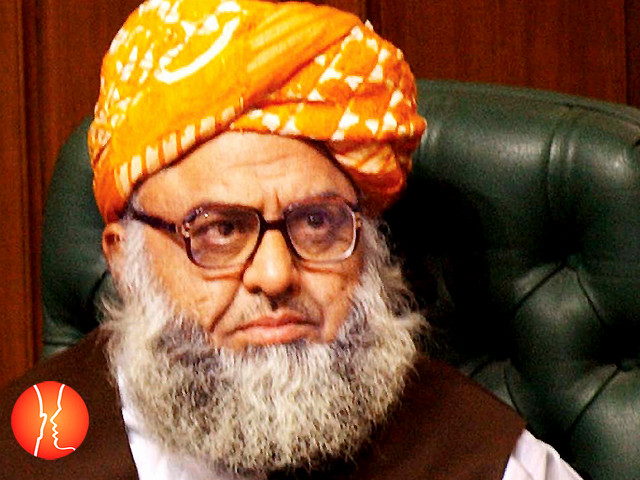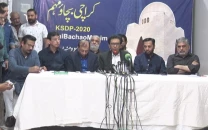WikiLeaks: The Fazlur Rehman connection
Intelligence reports published on WikiLeaks point to Maulana Fazlur Rehman being involved in the Afghan insurgency.

WikiLeaks: The Fazlur Rehman connection
WikiLeaks - The role of JUI-F
One report, filed on February 27, 2004, implicates Rehman even though his name and the party’s name are misspelled. Most of the reports on WikiLeaks are written in military jargon and names are spelled phonetically.
The report alleges that Rehman was involved in funding propaganda and assassinations. According to the report, the leader was “paying unidentified individuals in Lashkar Gah, Helmand province, AF to distribute propaganda in a letter/note form.” It further states that the propaganda being spread was against countries involved in the Afghan war, and that it came with a monetary incentive. “The propaganda mentions how host nation commanders that work with US forces, are the same as Americans; therefore, they should die. Each letter offers an unspecified amount of money for the death of host nation commanders and Americans. The letters are placed at the homes of individuals who are known to work with Americans.”
According to The New York Times, 17 foreign contractors and aid workers were killed in Afghanistan in the first six months of 2004, while 15 to 20 soldiers had been killed by the Taliban in Helmand alone.
Another report published by WikiLeaks also cites the JUI but does not mention which faction of the political party was involved. Dated August 10, 2004, the report details an attack that took place the same day.
“One of the food for work daily labourers guarding road construction tools on the road that Mission East is building to Chal from Taluqan, was attacked by three men. He was beaten and hung upside down by rope around his feet, threatened, and 3,000 Afghanis were stolen from him. He was also asked why he was working for an international organisation and warned not to do so. The victim said the three men were from the local area. The attack took place near the village of Tally. This is where mullahs from Jamiatula Olama (sic), Pakistan, had recently been preaching against the government, UN, NGOs and the road construction project to Chal.”
There are dozens of instances recorded in the WikiLeaks files of propaganda and threatening letters, which are received by educationists and government officials among others. They form a pattern of intimidation that is used by the Taliban to deter Afghans from supporting the US and allied forces, and as this report shows, are linked to militant activities.
Fazlur Rehman’s militant links
The JUI-F is cited as one of the key groups that supported the mujahideen in the 1980s and along with other figures such as Mullah Mohammad Omar, Masood Azhar and Hafiz Saeed, the party was a lynchpin of the movement that would see thousands of young men enrol in ‘jihad’. According to experts, the JUI-F was not just involved on an ideological level but also provided the networks and physical support in the form of graduates who would fight in Afghanistan. The madrassahs set up by the JUI-F became a breeding ground for young men who were recruited by the Afghan mujahideen. Their associates have gained greater notoriety, as several key leaders of the Tehrik-e-Taliban Pakistan (TTP) have been associated with the JUI-F madrassahs, including Waliur Rehman.
According to analysts, the JUI-F still has a presence in the decision-making process of Afghan insurgents, and maintains close ties to the Haqqani network. Khadim Hussain from the Aryana Institute for Regional Research and Advocacy says that “While Fazlur Rehman is not personally active; he does direct his close associates and confidantes who are represented on the shuras in Waziristan and Quetta and are involved with the decision-making process.”
JUI-F leader Fazlur Rehman is widely known to hold strong anti-American views, and was one of the leading opponents of the war in Afghanistan. As a result, he was placed under house arrest in 2001 for inciting people against the armed forces and attempting to overthrow the government, but was released in 2002.
Two years after his release, Rehman’s party was part of the Muttahida Majlis-e-Amal (MMA) coalition group that formed the provincial government in Khyber Pakhtunkhwa and Balochistan. The MMA government’s reign in Khyber Pakhtunkhwa was marred with controversy, as they put an end to cultural activities, sought to implement Shariah law in the province, and were known for their vocal stance against the US.
In a 2003 interview with Newsline magazine, Rehman denied that religious parties in Pakistan were following the Taliban’s lead. “The Taliban were misrepresented,” he said. “Their system was an ideal Islamic system, but they were trying to implement it by force.” The Jamiat Ulema-e-Islam (F) is also an ally of the current Pakistan Peoples Party-led government. Fazlur Rehman built his ties with the PPP during Benazir Bhutto’s second tenure as prime minister and also served as chairman of the foreign relations committee in the National Assembly.
Fazlur Rehman could not be reached for a comment.
Published in The Express Tribune, August 7th, 2010.



















COMMENTS
Comments are moderated and generally will be posted if they are on-topic and not abusive.
For more information, please see our Comments FAQ